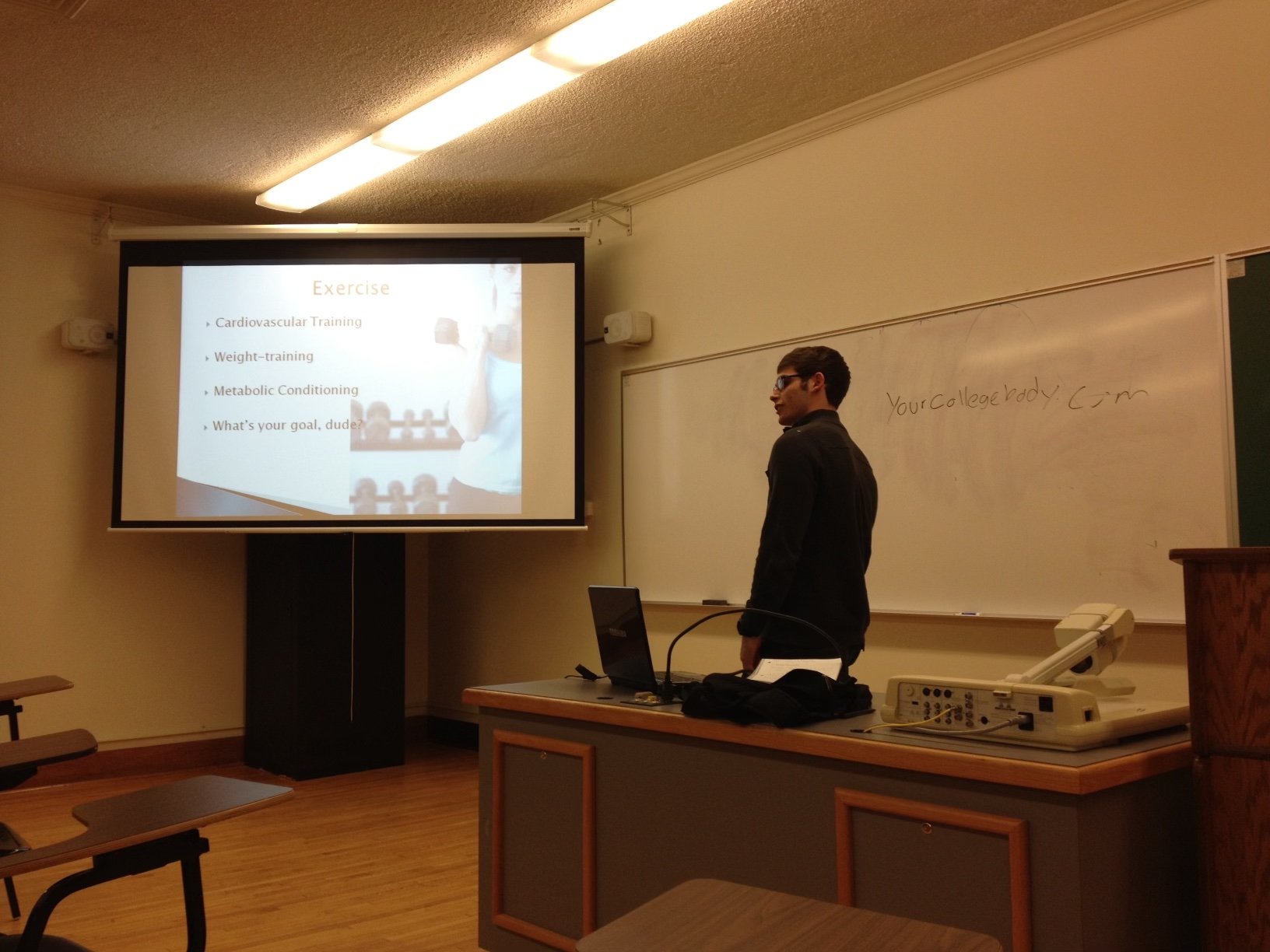How to Become Great at Anything
Aug 08, 2024This is a photo of your boy at my first-ever public speaking gig at Wake Forest University in 2011.

It’s hard to describe how poorly it went.
I got paid $20 to speak in a room of 8 people — one of which was my father (not sure how he even got in) and another one who was stone-cold asleep after I got through my first slide. The dude was literally drooling.
I didn’t have a mastery of the material…
I had huge sweat stains from being so nervous...
And frankly, I was just a terrible speaker...
I’ve now done hundreds of speaking gigs, and spoiler alert, I’m a lot better.
There’s a study by Dan Chambliss called “The Mundanity of Excellence” that looks at competitive swimmers and what it takes to achieve excellence. He found that becoming great is actually quite boring.
👉 They practice hard
👉 They put in consistent, everyday effort instead of the occasional, intense burst
👉 They stay focused on a singular goal
👉 They accumulated small, incremental gains over time
Most importantly, everyone who achieved greatness had a time when they weren’t so good.. Being bad, having sweaty armpits, and a kid sleeping in the back right corner is a part of the process.
There’s concepts in psychology like The Flynn Effect (highlighting the startling gains in IQ over the past century) and Maturation Theory (with age comes persistence, resilience and wisdom).
These aren’t earth-shattering ideas. I’m sure you’re shocked to learn that with time comes improvement. But in an age of “optimizing” and “hacking” and twenty-year-old billionaires, we can forget the most basic elements of human nature.
I was reminded of the Chambliss study again this week because I recorded my 100th podcast episode. And I'm proud of how much better episode #100 is than episode #1.
The number one hundred also reminded me of this piece of advice that I heard years ago.
There's this dude, Alex Hormozi, who's HOT right now. And for good reason – his stuff is great. I once saw him talk about how successful people expand their units of time and effort. For instance, a newbie might think of time and energy output in terms of hours (i.e. I spent 3 hours baking this sourdough bread). I used to see this all the time in beginners to health and fitness – a client would implement a new habit for a day or two, not lose weight, and discard the strategy forever.
A moderately successful person might expand their units of output into the tens or dozens of hours. For example, I once spent 30 hours on a test project for a job I was applying for. It was the first time I expanded my units into the tens of hours spent (30 hours = 3 units). The project was better than anything else I'd produced before, and I landed the job because of that project.
However, according to Hormozi, experts and seriously successful people think in the hundreds of hours of output. This idea is based on the fact that significant progress and mastery in anything comes from substantial, focused effort over a prolonged period of time. Instead of expecting quick results, Hormozi encourages dedicating a considerable amount of time to honing skills and executing strategies.
So, with episode #100, I still have a long way to go, BUT It's my first unit in the books, and I'm proud of that. And although the first unit being completed doesn't put me in a chair next to Oprah, it has given me my first inkling of success. I've booked some leadership workshops, increased my clout in my industry, and it's given me something psychologists call ultimate concern in my work. Ultimate concern refers to the deepest, most fundamental priorities, values, or commitments that provide a person's life (or, in my case, my work) meaning, purpose, and clarity. It's the over-arching principles that guide our decisions, choices, and lower-level goals.
In her book Grit, Angela Duckworth gives an example from Hall of Fame Pitcher Tom Seaver. In his Hall of Fame speech, Seaver talks about how pitching is his Ultimate Concern and how it guides everything he does:
"Pitching . . . determines what I eat, when I go to bed, what I do when I'm awake. It determines how I spend my life when I'm not pitching. If it means I have to come to Florida and can't get tanned because I might get a burn that would keep me from throwing for a few days, then I never go shirtless in the sun. . . . If it means I have to remind myself to pet dogs with my left hand or throw logs on the fire with my left hand, then I do that, too. If it means in the winter I eat cottage cheese instead of chocolate chip cookies in order to keep my weight down, then I eat cottage cheese."
So, if nothing else, doing 100 episodes has given me much more clarity around the ultimate concern of this podcast and my work. And that's powerful.
The point is that to achieve anything meaningful, to move the needle even a little bit towards being great, we have to show up repeatedly, and oftentimes, it will be painful. But that's not a sign that you're on the wrong path. It's a feature, not a bug, of the process.
I still have many areas for improvement in my speaking, but at least I don't have to deal with sweat stains anymore. Just because you're struggling now doesn't mean you always will. Stay in the game, get your first 100, and see what happens.
SUBSCRIBE FOR WEEKLY LEADERSHIP LESSONS
Get Tools, Strategies, + Insights to Be a Great Leader Directly to Your Inbox Every Friday.
We hate SPAM. We will never sell your information, for any reason.
